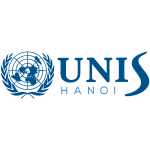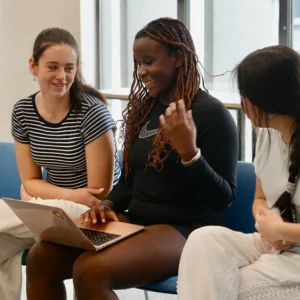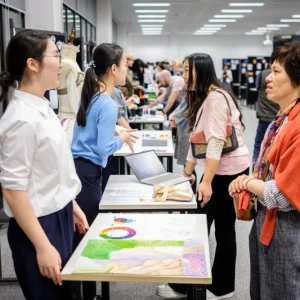Innovative teaching strategies are creative, evidence-based approaches that enable active, tailored, and culturally responsive learning. In today’s complex world, students must be empowered to think critically, respond flexibly, and act meaningfully with the problems they face.
Below, we present 8 innovative teaching strategies with specific examples of how we at UNIS Hanoi apply them in our classrooms to promote curiosity, motivation, and lifelong learning.
8 Top Innovative Teaching Strategies to Inspire Student Engagement
We implemented these innovative teaching strategies here at UNIS Hanoi to create student engagement, encourage creativity, and foster global competence. We integrate each strategy purposefully into our curriculum to establish curiosity, reflection, and thoughtful collaboration.
1. Active and Inquiry-Driven Techniques
Active and inquiry approaches place learners at the centre. Instead of passively absorbing information, students acquire knowledge through finding out, asking questions, and constructing knowledge with others. Inquiry-based learning draws on children’s curiosity to help them be responsible for their learning process.

These techniques, like think-pair-share, peer discussions, Socratic seminars, or problem-based questioning, foster engagement and encourage deeper connections.
Active learning strategies are the foundation of our UNIS Hanoi IB inquiry units.
Faculty regularly employ think-pair-share and similar techniques, supported by faculty development sessions that strengthen teachers’ facilitation skills. Classrooms transform into vibrant, engaging, and dialogue-filled environments.
2. Project-Based Learning (PBL)
Project-Based Learning is long-term, real-world projects where students acquire knowledge, collaborate, and reflect to address actual problems. It builds grit, autonomy, and capacity far beyond the test. Children learn to pose questions, develop plans, tackle timelines, and document outcomes.

Project-Based Learning (PBL) is flourishing at UNIS Hanoi with projects like our STEAM Project Week where students create models of sustainable cities using advanced digital tools.
We also collaborate with local NGOs, offering students an opportunity to work on critical environmental concerns and offer solutions to community stakeholders.
Additionally, our MYP “Phoenix’s Nest” project motivates students to embrace sustainability issues, researching alternatives for disposable plastics, designing solar power systems, or planning cultural heritage exhibitions that integrate art, history, and design.
3. Interdisciplinary Learning
Interdisciplinary learning integrates multiple subject areas to explore problems holistically. Combining data from science, humanity, mathematics, and art, students acquire global understanding, critical thinking, and understand relationships that are hard to define in isolated study.

Interdisciplinary units form a central part of our Middle Years Programme at UNIS Hanoi.
Projects, for instance, may challenge students to explore historical issues through evidence from science or resolve environmental problems in creative performance.
By approaching problems in this way, students become intellectually flexible and prepare themselves to deal with complexity with ease.
4. Challenge-Based Learning (CBL)
Challenge-Based Learning teaches students to work together to tackle real-world problems with authentic outcomes.
Based on Apple’s ACOT2 model, CBL takes problem-solving an extra step by placing responsibility in students’ hands. They identify meaningful challenges, research, develop solutions, and test results.

At UNIS Hanoi, service-learning is deeply connected with CBL. Students address real issues in the local area such as wildlife conservation, fairness in education, or urban environment.
They design projects with real-world impact, from creating awareness campaigns to designing helpful tools or partnerships.
Reflection is central: students review both failure and success, which refines their skills for the future. This blend of doing and reflecting builds empathy, civic responsibility, and resilience.
5. Personalised & Blended Learning
Personalised and blended learning adapts instruction to suit individual learners’ needs.
With online and classroom learning, students receive flexibility while still benefiting from teacher guidance. This format recognises that each learner is unique and works towards creating customised paths to success.

We encourage individualised paths within UNIS Hanoi via individual mentoring, reflective diaries, and goal-setting. Students utilise planners for planning academic goals and well-being, blending teacher-led courses with self-paced study.
For example, a student who is good in maths but has difficulties with writing can receive differentiated support while maintaining overall progress. This approach promotes autonomy, accountability, and allows all students to receive scaffolding they need to thrive academically and emotionally.
6. Gamification & Game-Based Learning
Gamification takes concepts from game-like frameworks, points, challenges, or narrative and uses them in the classroom, and game-based learning has formally constructed games designed for meeting learning goals.
Both are leveraging intrinsic student motivation to make learning experiences more enjoyable and rewarding.

At UNIS Hanoi, gamification is just beginning to shape inquiry units.
For instance, students are given points for collaboration, can gain levels of inquiry as they master ideas, or solve story-challenges that make learning come alive.
Early trials suggest that gamification strengthens focus, builds resilience, and encourages collaborative problem-solving. As it develops further, this practice will be an influential addition to existing practices.
7. Reflective & Metacognitive Practices
By analysing their thinking habits, students discover their strengths, weaknesses and how to progress. These skills enable children to learn how to learn, which is invaluable in a world where information is constantly changing.

At UNIS Hanoi, reflective practice is embedded at all levels of curriculum.
Students maintain journals, set learning goals, and participate in mentoring sessions to monitor progress. Teachers guide learners to create hypotheses, test assumptions, and critically evaluate outcomes.
Through this process, students acquire habits of mind that enable them to respond to challenges with resilience and adaptability. Reflection also maximises emotional well-being, enabling students to establish balance with academic success.
8. Culturally Inclusive & Global Learning
Culturally responsive teaching transforms the curriculum to make it relevant to all students by connecting curriculum with their multicultures.
It gives a sense of belongingness and makes the students ready for success in multicultural and globalised life. Global learning goes further by infusing cross-cultural knowledge in daily teaching.

Cultural diversity is the essence of UNIS Hanoi values.
Students take part in storytelling festivals that honour diverse traditions, and learn lessons from diverse viewpoints and languages. Our global student community makes being culture-sensitive not theory but a practice.
By learning from each other’s stories, students become more empathetic, open-minded, and globally competent.
Discover Innovative Teaching and Learning at UNIS Hanoi
Innovative teaching strategies are not abstract theories; they are the methods through which we nurture curiosity, deepen learning, and equip students with essential 21st-century skills.

At UNIS Hanoi, these strategies are brought to daily life, ensuring that learners achieve academically and grow as adaptable, empathetic, and responsible global citizens.
We invite parents to discover how our innovative classroom practices can benefit your children. Connect with us to experience our student-centred learning community and witness the transformative impact of education that values both excellence and inclusion!
Author Profile

- UNIS Hanoi is ever-evolving, but one thing that remains is our passion to nurture and equip students to be agents of change for a better world.
Latest entries
 UNIS Hanoi Address1 Jan 2026Reflection Questions for Students: A Practical Guide to Deeper Learning
UNIS Hanoi Address1 Jan 2026Reflection Questions for Students: A Practical Guide to Deeper Learning Calendar, News and Publications14 Dec 2025UNIS Hanoi: Leading the Way in Multicultural Environmental Education
Calendar, News and Publications14 Dec 2025UNIS Hanoi: Leading the Way in Multicultural Environmental Education Calendar, News and Publications30 Oct 2025What is an IB School? A Complete Guide for Parents
Calendar, News and Publications30 Oct 2025What is an IB School? A Complete Guide for Parents Calendar, News and Publications29 Oct 2025School Tour at UNIS Hanoi – A Comprehensive Guide for Parents
Calendar, News and Publications29 Oct 2025School Tour at UNIS Hanoi – A Comprehensive Guide for Parents
